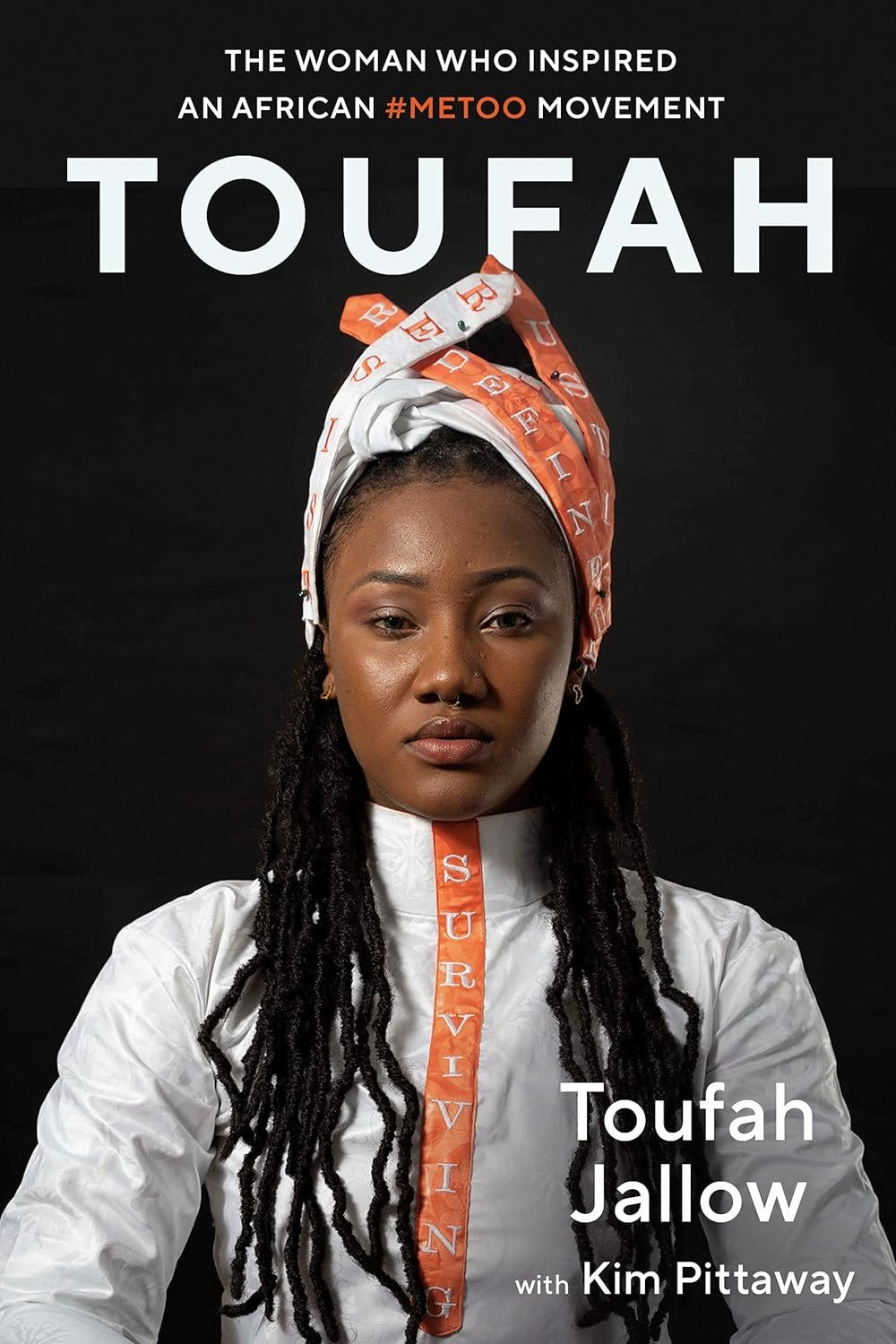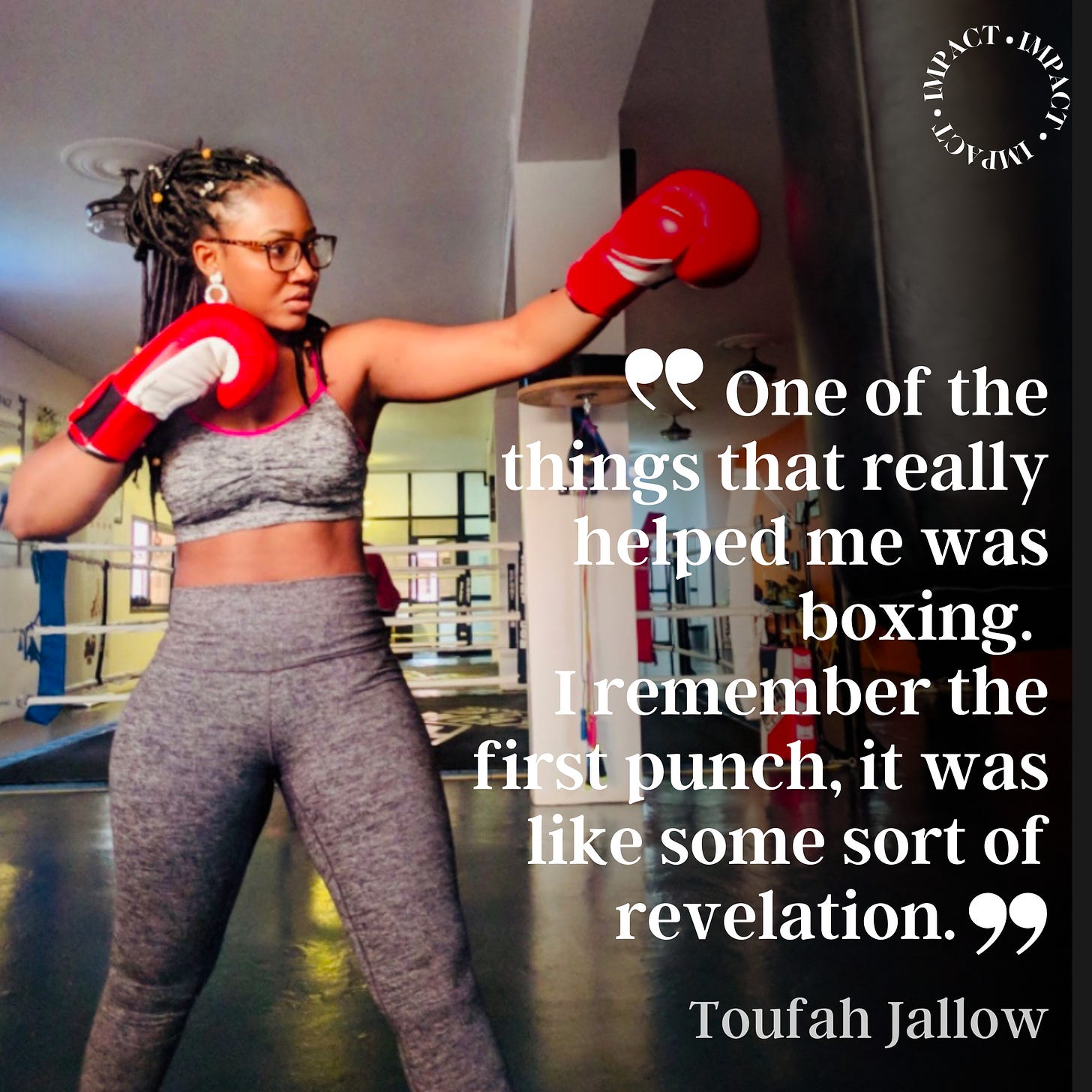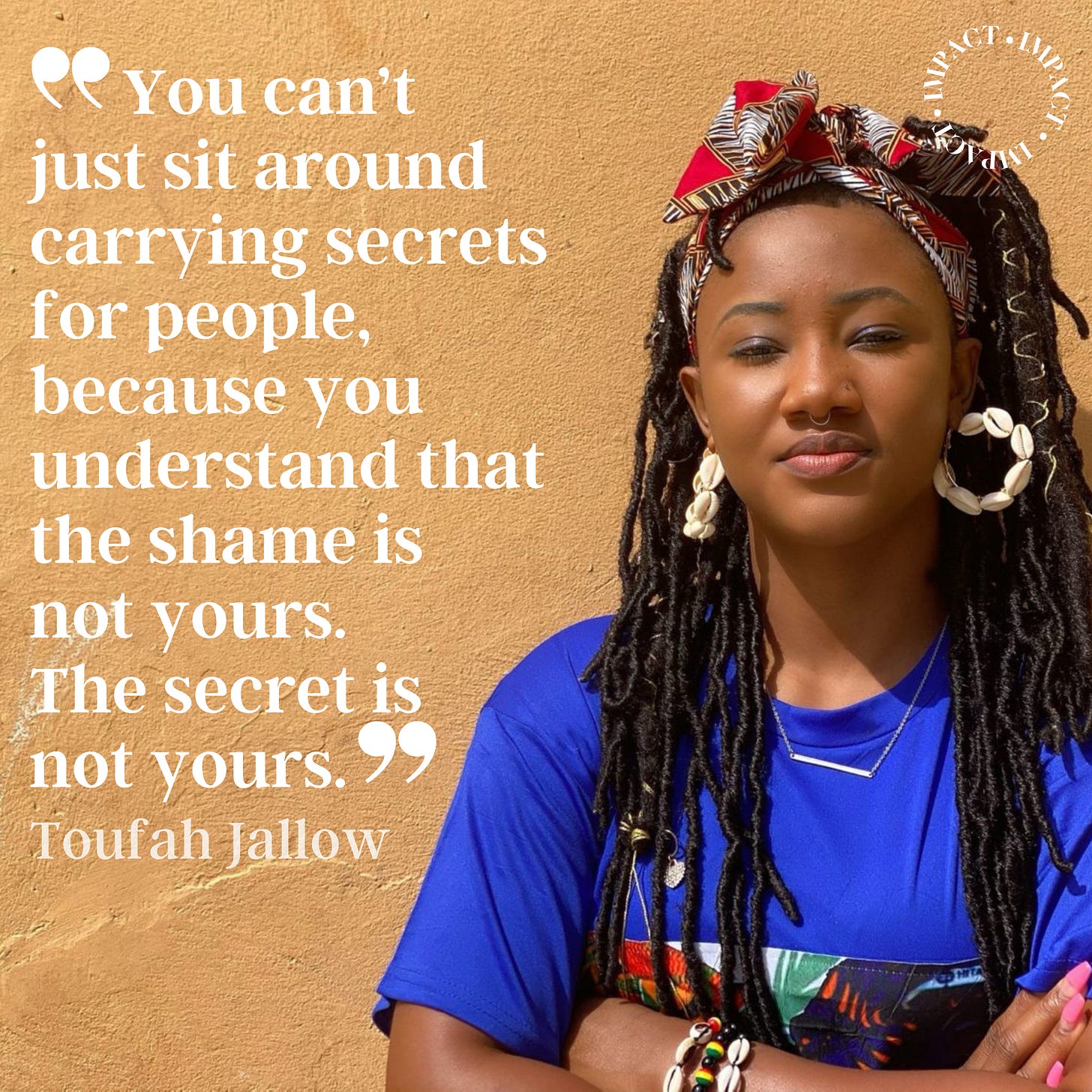“The secret is not yours” — the woman behind an African #MeToo movement
Toufah Jallow’s suvivor-led revolution in The Gambia
- 🇬🇲 Toufah Jallow was just a teenager when she had to flee The Gambia after the country’s president raped her.
- 📣 But Jallow didn’t hide — she kicked off a West African #MeToo movement when she spoke out about what she had experienced, despite the risks.
- 📖 She tells her story in Toufah: The Woman Who Inspired an African #MeToo Movement. Read on to find out how to win a copy!
If you want to be up-to-date on feminism worldwide, follow us on LinkedIn and Instagram.
Parlez-vous français ? Impact is also available in French:
When Toufah Jallow was eighteen years old, she won a national beauty pageant in the West African nation of The Gambia. The prize, she was told, would be a scholarship to study abroad. Instead, the country’s authoritarian leader, Yahya Jammeh, drugged and raped her in his presidential compound.
In a country where political dissent was crushed by its long-serving president, a man who imprisoned his opponents, strangled the press and peddled his own herbal “remedies” for HIV/AIDS, Jallow could have become one more silenced voice. But in the days after she was raped, she escaped to Senegal by boat, disguised beneath a niqab, and was eventually given refugee protection in Canada.
Separated from her family, friends and everything she had ever known, forced to start again alone in a new country, this could also have been the end of Jallow’s story. But when Jammeh lost a presidential election to Adama Barrow in 2016, eventually fleeing to Equatorial Guinea, Jallow decided to tell her story.
In 2019, she returned to The Gambia, testifying before the country’s Truth, Reconciliation and Reparations Commission into the human rights violations of the Jammeh years. She became the first Gambian woman to speak out publicly about rape. In doing so, she inspired an African #MeToo movement, allowing other women to come forward anonymously with their own stories under the hashtag #IAmToufah, and leading a march against sexual violence through the streets of Banjul, The Gambia’s capital.
Toufah Jallow tells her astonishing story in her memoir, Toufah: The Woman Who Inspired an African #MeToo Movement, co-written with Kim Pittaway. In Paris for the release of the French edition, Jallow sat down with the Impact newsletter to discuss the power of breaking silences, the change she helped bring to The Gambia and the “ancestral spirit of feminism”. This conversation has been edited for length and clarity.

Megan Clement: Reading your book, the thing that struck me the most is the power of silence. Perpetrators rely on the silence of victims in cases of sexual assault and rape all over the world. But in your case, there’s also a political dimension to that silence: the silence that Yahya Jammeh held over a country in which there was no political dissent. How did those two forces, the silence of being a survivor and the silence of being in this authoritarian context, combine for you, and how did you work to break them?
Toufah Jallow: My silence was not restricted to the fact that I was trying to maintain my family’s integrity, or trying to hide the shame, or all of these other things that just naturally comes with surviving violence, regardless of the circumstances. Living in a dictatorship is a dynamic that was unique to my situation. And for whoever found themselves within that context, speaking out was almost a death sentence. Because who are you speaking out to and who’s listening to you? I could not imagine a world where I could just walk into a police station. Let’s say I got through the shame, and I got through the stigma and all the cultural barriers at the time. Take all of that away, and I still could not speak. That is the price of dictatorship.
Megan Clement: You write about physical and mental training you did so you could eventually come forward with your story. Can you explain how that prepared you and why you needed to do it?
Toufah Jallow: First, I should acknowledge how much of a privilege it is to access therapy. I was able to go to therapy because I had nothing else going on in my life. I wasn’t a person who had a community to go out with, I just paid rent and food. So whatever money that was supposed to be used to build social skills, connect, go around and travel, I used all of that for therapy. It worked out. Getting the right therapist really did help because she could see the things I didn’t even know that I needed. One of the things that really helped me was boxing. I remember the first punch. It was like some sort of revelation. It just feels right.

Megan Clement: The mental training involved repeatedly exposing yourself to the kinds of things people might say about you if you came forward with your story. That’s a worst nightmare, right?
Toufah Jallow: It really is. But it prepared me enough to be where I’m at. Because the truth is that it was going to happen. So I did it in a controlled space, where I could control how I react and see what my baseline is – where I break and where I don’t break. As brutal as it was, I understood why we were doing it, and I was just building the neurons to be able to tackle that. It’s been super helpful for me. I think what affected me a bit more [when I spoke out] was the people it was coming from – not what was being said, but who was saying it. If you hear someone that you admired or envied say some of these things, it hurts, but it’s not the words. We could not anticipate all the people who would or would not say something, but we could anticipate all the things that would be said based on the cultural setting.
Megan Clement: I was reading your book at the same time as allegations of sexual assault came out against the British comedian, Russell Brand. And I would read all the victim-blaming towards these women that was happening on Twitter, and then I would read your book, and it was the same language being used about them as was used about you.
Toufah Jallow: It’s the same narrative, it just depends on how it is said. The cornerstone of all of it is, “How dare you? How dare you speak up against this powerful person?” Whatever they think is based on the intensity of the patriarchy within our culture. It’s like, “We’re going to put you in your place, and we are going to make sure it’s not comfortable for the next person.”
This is why I am huge on preparing women. I think it’s okay to advocate for women to speak up. But I think what we need to do as women’s rights movements is to make sure we are honestly preparing the people who we are trying to encourage to speak out. I’m less about “let’s speak out publicly”, and more about “let’s build soldiers who can actually stand speaking out and understand that they’re speaking for our community within a community.”
As a movement, we should know the playbook is always the same. We need more camaraderie in preparing people to be strong enough. It doesn’t matter how famous you are, how poor you are, how rich you are – as long as you’re a woman speaking up against a powerful man, this is what happens. We’re not accepting it. We’re just acknowledging it and preparing for it.
Megan Clement: You write that when you were thinking about whether to come forward, you were researching sexual violence in the Gambia, and you could only find statistics and no names. What made you feel that someone needed to be the face of sexual violence in your country, and that the face needed to be yours?
Toufah Jallow: To be honest, I think it was out of selfishness. For me to accept those numbers, to accept that other people have not survived, it was validating the narrative that I was alone. And I just couldn’t be. A huge part of it was a yearning for community. I was like, God, it can’t be true, this thing that survivors tell themselves: “I’m alone, this is unique to me”. I didn’t want to confirm that, because confirming that would just break me even further. That is why the numbers bothered me a lot. I saw myself standing in a field by myself. And somewhere in your subconscious, you’re like, “There has to be other people hiding behind these mountains or something. I can’t be alone. So what do I do to bring them out of hiding?” When I did speak out, there was nothing that felt more healing for me than seeing and hearing all of those women and telling myself, “Yes, you are not alone.”
Megan Clement: What would say to someone who’s in a similar position, struggling with whether to come forward with their story or not?
Toufah Jallow: Coming forward is the end product of the work that you do. When proper healing is done, and the work that it takes to get to a place to understand why what happened to you happened to you takes you to a place where you can completely shift the blame, not just seeing it but genuinely believing it in your heart. Then you see the need and you recognise that you’re part of a larger community. The natural end product just happens to be either working in the field to help people like you, or speaking out. It just happens because you now know too much and you have healed so much that you can’t just sit around carrying secrets for people because you understand that shame is not yours. The secret is not yours.
So if there’s anyone in my situation, I’d say focus on yourself – use all of that energy in trying to position yourself in the world where you are actually a survivor, where you understand the dynamics. Heal as much as you can, take your time. You can support other survivors, you can be part of the collective force, you can march with us in the streets, you can join and volunteer, you can do all of that while still doing the healing that you need to do.

Megan Clement: What do you think has changed in the Gambia thanks to your work?
Toufah Jallow: We speak openly about rape now and I am shocked. We went from not having words for something to now just outright talking about it. There have been a lot of conversations, especially online. Part of the recommendations from the Truth, Reconciliation and Reparations Commission are to prosecute sexual crimes, even against Jammeh himself. That is a huge win. The issue of sexual violence is central to holding the former government accountable.
Megan Clement: My last question is one that I ask of everybody I interview. What gives you hope?
Toufah Jallow: I find hope in the things we don’t say, but we share an experience and translate in all languages, especially among women. People can erase notes that you write to people, books can be burned down, feminist spaces can be burned down or erased, laws can be made, all of that can happen. But there is this unspoken sense of feminist resistance that I find so much hope in because it survives all cultures, all dynamics, from the educated to the uneducated and between all genders. It just happens – the kind of feminist transference that happened from my grandmother to my mother and from my mother to me. Maybe we can call it the ancestral spirit of feminism.
Join us for an expert discussion on sex education
We are delighted to be participating in a roundtable discussion hosted by the UNFPA, the United Nations sexual and reproductive health agency, dedicated to our recent collaborative series on comprehensive sexuality education.
Join us on Tuesday, November 21st at 15:00 CET for Covering Sex-Ed: Lessons From ‘The Talk’ Reporting Series, in which journalists and UNFPA experts will explore common threads in reporting on sexuality education and explore the space for solutions in an increasingly polarised global media environment.
Sign up by clicking the button below👇
And you can find all the journalism produced for ‘The Talk’ series here.